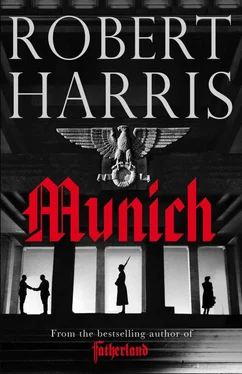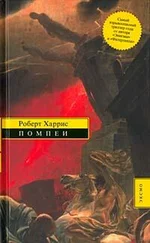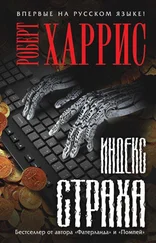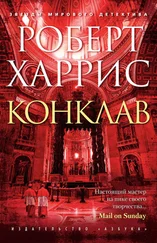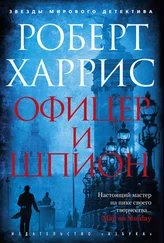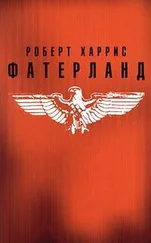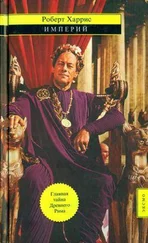There was a pause. She said quietly, ‘And what about you?’
‘I have to stay here overnight. I’ll try to call you later. I have to go now. You will do this? You promise me?’
‘Yes, all right, if you insist.’ He could hear one of the children in the background. She hushed them: ‘Quiet, I’m talking to your father.’ And then to him: ‘Do you want me to bring you an overnight bag?’
‘No, don’t worry. I’ll try to slip out at some point. You concentrate on getting out of London.’
‘I love you — you do know that?’
‘I know.’
She waited. He knew he ought to say something back but he couldn’t find the words. There was a clatter as she hung up, and then all he could hear was the dialling tone.
Someone knocked on the door.
‘Just a moment.’ He folded his notes from the Chiefs of Staff meeting in half, and then in half again, and slipped them into his inside pocket.
In the corridor was Wren, the messenger. Legat wondered if he had been listening. But all he said was, ‘The BBC have arrived.’
For the first time since the crisis started, there was a large crowd in Downing Street. They had gathered quietly near the photographers on the opposite side of the street to Number 10. What seemed to have attracted their attention most was a large dark-green van with the BBC’s coat of arms and OUTSIDE BROADCAST painted on its sides in gold lettering. It was parked just to the left of the front door. A pair of technicians was feeding cables from the back of the van, across the pavement, and through one of the sash windows.
Legat stood on the doorstep arguing with the young engineer, whose name was Wood. ‘I’m sorry, but I’m afraid it’s just not possible.’
‘Why not?’ Wood wore a V-necked pullover under a brown corduroy suit.
‘Because the Prime Minister will be holding meetings in the Cabinet Room until half-past seven.’
‘Can’t he hold them somewhere else?’
‘Don’t be absurd.’
‘Well, in that case, couldn’t we do the broadcast from a different room?’
‘No, he wishes to address the British people from the heart of government, and that is the Cabinet Room.’
‘Well, look — we’re on the air at eight and it’s gone six now. What if the equipment fails because we haven’t tested it properly?’
‘You’ll have half an hour at the very least, and if I can get you any more time, I shall—’
He broke off. Behind Wood’s shoulder, a black Austin 10 was turning from Whitehall into Downing Street. The driver had switched on the headlamps in the early-evening gloom and was edging forwards slowly to avoid hitting some of the onlookers who had spilled off the pavement into the road. The newsreel cameramen recognised the passenger before Legat did. The brilliance of their arc lights briefly blinded him. He raised his hand to shield his eyes. He muttered, ‘Excuse me,’ to Wood, and stepped down on to the pavement. As the car drew to a halt he opened the rear door.
Hunched down in his seat, Sir Horace Wilson had an umbrella between his knees and a briefcase cradled on his lap. He gave Legat a weak smile and slid out of the car. On the step of Number 10 he turned for an instant, his expression lugubrious and non-committal. The flashbulbs popped. He scuttled inside, like some nocturnal animal allergic to light, ignoring his companion who was emerging from the other side of the car. He advanced towards Legat, hand outstretched. ‘Colonel Mason-MacFarlane. Military attaché, Berlin.’
The policeman saluted.
In the entrance hall, Wilson was already shedding his overcoat and hat. The Prime Minister’s Special Adviser was a slight, almost emaciated figure, with a long nose and pendulous ears. Legat had never found him less than polite, even on occasions slyly charming — the sort of reserved senior colleague he feared might one day unburden himself of confidences one would prefer not to hear. He had made his reputation at the Ministry of Labour dealing with trade union leaders. The thought that he had come straight from delivering an ultimatum to Adolf Hitler was bizarre. Nevertheless, the Prime Minister considered him indispensable. He placed his rolled umbrella carefully into the stand next to his master’s and turned to Legat. ‘Where’s the PM?’
‘He’s in his study, Sir Horace, working on his broadcast for tonight. Everyone else is in the Cabinet Room.’
Wilson set off confidently towards the back of the building. He beckoned to Mason-MacFarlane to follow him. ‘I want you to brief the PM as soon as possible,’ he said, and added over his shoulder to Legat, ‘Would you be kind enough to tell the PM I’m back?’
He threw open the doors to the Cabinet Room and marched in. Legat had a glimpse of dark suits and gold braid, of strained faces and of coiling blue clouds of cigarette smoke suspended in the dusky light, and then the door was closed again.
He walked down the corridor, past Cleverly’s office, and Syers’s, and his own, to the main staircase. He ascended past black-and-white etchings and photographs of every Prime Minister since Walpole. By the time he reached the landing the house had metamorphosed from gentlemen’s club into a grand country mansion, mysteriously deposited in central London, with sofas and oil paintings and high Georgian sash windows. The vista of empty reception rooms was quiet and deserted; beneath the thick carpet the floorboards creaked. He felt like an intruder. He knocked lightly on the door to the Prime Minister’s study. A familiar voice said, ‘Come.’
The room was large and light. The Prime Minister was sitting with his back to the window, bent over his desk, writing with his right hand, a cigar burning in his left. An array of pens and pencils and ink pots stood on a little rack in front of him, alongside a pipe and a tobacco jar; apart from these, and his ashtray and a leather-bound blotter, the big desk was bare. Legat had never seen a man look lonelier.
‘Sir Horace Wilson has returned, Prime Minister. He’s waiting to see you downstairs.’
As usual, Chamberlain did not look up. ‘Thank you. Would you mind holding on for a moment?’ He paused to suck on his cigar and then continued to write. Wreaths of smoke hung around his grey head. Legat stepped over the threshold. In four months he had never had a proper conversation with the Prime Minister. On several occasions, minutes he had submitted overnight had come back the following morning with expressions of gratitude written in the margins in red ink — ‘ A first-rate analysis. ’ ‘ Clearly worked-out and well-expressed, thank you, NC ’ — and he had found himself more touched by these schoolmasterly words of praise than by any amount of the usual politician’s bonhomie. But he had never been addressed by name — not even by his surname, as Syers usually was, let alone by his Christian name, which was a distinction reserved for Cleverly alone.
The minutes passed. Surreptitiously Legat took out his watch and checked it. Eventually, the PM finished writing. He replaced his pen in the rack, balanced his cigar on the edge of the ashtray, and gathered together the sheets of paper. He squared them and held them up. ‘Would you be so good as to have these typed?’
‘Of course.’ Legat walked over and took the pages; there were about a dozen.
‘You’re an Oxford man, I suppose?’
‘Yes, Prime Minister.’
‘You have a turn of phrase, I’ve noticed. Perhaps you would read it through? If you find there are passages that need amplifying, feel free to make suggestions. I have so much else on my mind. I worry that somehow it does not flow .’
He pushed back his chair, retrieved his cigar, and stood. The sudden movement seemed to make him dizzy. He placed his hand on the desk to steady himself, then headed for the door.
Читать дальше
